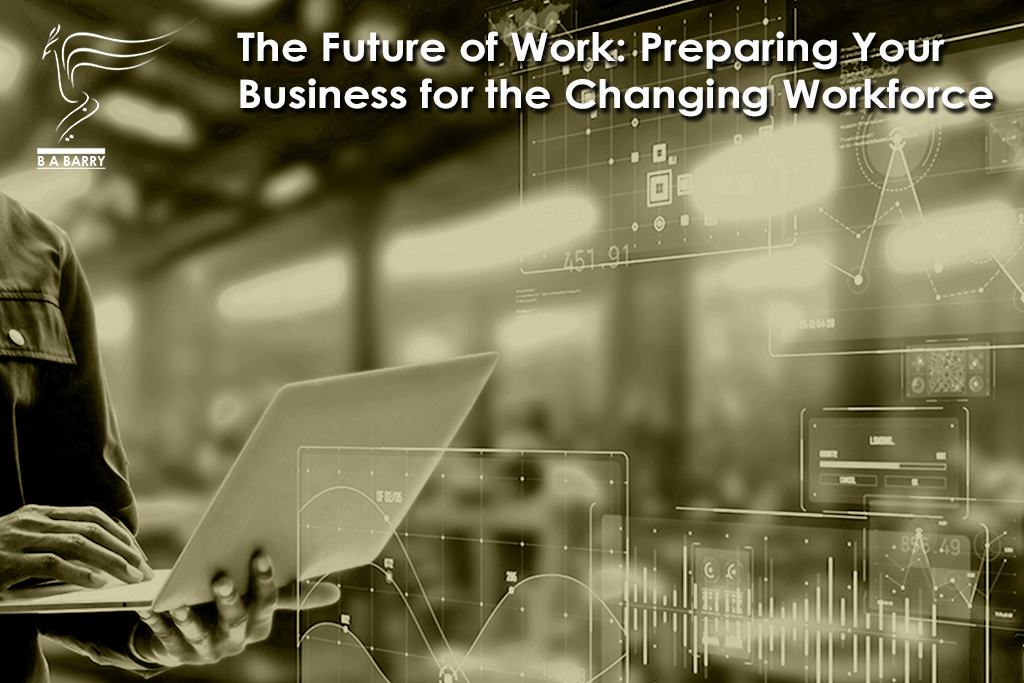- Tokyo : 11:12 |
- Singapore : 10:12 |
- Dubai : 06:12 |
- London : 02:12 |
- New York : 21:12 |
- Sydney : 13:12

The world of work is rapidly changing. Technological advancements and shifting demographics are transforming the way we work, creating new opportunities and challenges for businesses. As an entrepreneur & business advisor with over 20 years of experience, the owner of BA Barry group Mr. Basem Barry has witnessed firsthand the evolution of the workforce and the impact it has on businesses.
In this blog, we will discuss the future of work and provide tips on how businesses can prepare for the changing workforce.
One of the biggest drivers of change in the workforce is technology. Automation and Artificial Intelligence are transforming industries and changing the nature of work. Many jobs that were once performed by humans are now being done by machines. This trend is expected to continue, and businesses need to adapt to this new reality. To prepare for this change, businesses should focus on upskilling their employees. This means investing in training and education to help employees develop new skills that are in demand in the new economy. Businesses should also focus on developing a culture of continuous learning to ensure that employees remain relevant and adaptable in the face of change.
Another trend that is transforming the workforce is the shift towards remote work. The COVID-19 pandemic has accelerated this trend, and many businesses are now considering remote work as a permanent option. This presents both opportunities and challenges for businesses. On the one hand, remote work can increase productivity and reduce costs associated with office space. On the other hand, it can create challenges related to communication, collaboration, and employee engagement. To prepare for this change, businesses need to invest in technology and infrastructure to support remote work. They also need to develop policies and procedures to ensure that remote workers are engaged, connected, and productive.
The changing demographics of the workforce are also creating new challenges for businesses. As the baby boomer generation retires, businesses are faced with the challenge of attracting and retaining younger workers. Millennials and Gen Z have different expectations and priorities when it comes to work. They value flexibility, work-life balance, and purpose-driven work. To attract and retain these workers, businesses need to adapt their practices and policies to align with these values. This means offering flexible work arrangements, opportunities for professional development, and a strong corporate social responsibility program.
The gig economy is another trend that is transforming the way we work. Freelancers, independent contractors, and temporary workers are becoming a significant part of the workforce. This presents both opportunities and challenges for businesses. On the one hand, the gig economy can provide businesses with access to a highly skilled and flexible workforce. On the other hand, it can create challenges related to management, communication, and legal compliance. To prepare for this change, businesses need to develop policies and procedures to effectively manage gig workers. They also need to ensure that they are complying with labour laws and regulations related to gig workers.
Finally, the future of work is likely to be more focused on diversity and inclusion. The workforce is becoming more diverse, and businesses that fail to embrace diversity and inclusion are likely to be at a disadvantage. To prepare for this change, businesses need to develop policies and practices that promote diversity and inclusion. This means creating a culture of inclusion, providing training on unconscious bias, and actively recruiting a diverse workforce.
In conclusion, the future of work is rapidly evolving, and businesses need to adapt to these changes to remain competitive. To prepare for the changing workforce, businesses should focus on upskilling employees, investing in technology to support remote work, adapting practices and policies to align with the values of younger workers, developing policies and procedures to effectively manage gig workers, and promoting diversity and inclusion. By embracing these changes, businesses can position themselves for success in the new economy. We strongly encourage businesses to take proactive steps to prepare for the changing workforce.